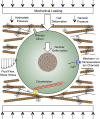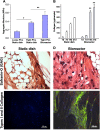Mechanical regulation of chondrogenesis
- PMID: 23809493
- PMCID: PMC3707042
- DOI: 10.1186/scrt211
Mechanical regulation of chondrogenesis
Abstract
Mechanical factors play a crucial role in the development of articular cartilage in vivo. In this regard, tissue engineers have sought to leverage native mechanotransduction pathways to enhance in vitro stem cell-based cartilage repair strategies. However, a thorough understanding of how individual mechanical factors influence stem cell fate is needed to predictably and effectively utilize this strategy of mechanically-induced chondrogenesis. This article summarizes some of the latest findings on mechanically stimulated chondrogenesis, highlighting several new areas of interest, such as the effects of mechanical stimulation on matrix maintenance and terminal differentiation, as well as the use of multifactorial bioreactors. Additionally, the roles of individual biophysical factors, such as hydrostatic or osmotic pressure, are examined in light of their potential to induce mesenchymal stem cell chondrogenesis. An improved understanding of biomechanically-driven tissue development and maturation of stem cell-based cartilage replacements will hopefully lead to the development of cell-based therapies for cartilage degeneration and disease.
Figures




References
-
- Estes BT, Gimble JM, Guilak F. Mechanical signals as regulators of stem cell fate. Curr Top Dev Biol. 2004;60:91–126. - PubMed
Publication types
MeSH terms
Grants and funding
LinkOut - more resources
Full Text Sources
Other Literature Sources

